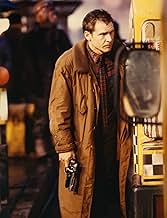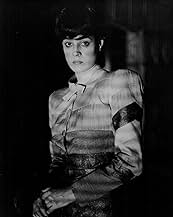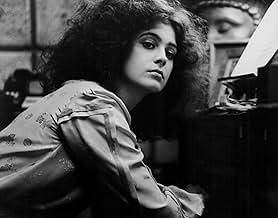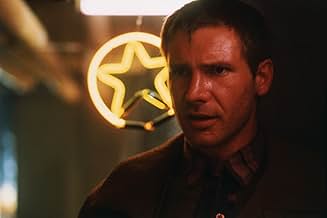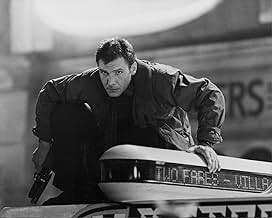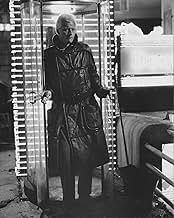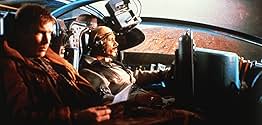Um corredor deberá perseguir é acabar com quatro replicantes que roubaram uma nave no espaço, e deberá regresar á Terra e encontrar seu criador.Um corredor deberá perseguir é acabar com quatro replicantes que roubaram uma nave no espaço, e deberá regresar á Terra e encontrar seu criador.Um corredor deberá perseguir é acabar com quatro replicantes que roubaram uma nave no espaço, e deberá regresar á Terra e encontrar seu criador.
- Direção
- Roteiristas
- Artistas
- Indicado a 2 Oscars
- 13 vitórias e 22 indicações no total
Kimiko Hiroshige
- Cambodian Lady
- (as Kimiro Hiroshige)
Bob Okazaki
- Sushi Master
- (as Robert Okazaki)
- Direção
- Roteiristas
- Elenco e equipe completos
- Produção, bilheteria e muito mais no IMDbPro
Resumo
Reviewers say 'Blade Runner' is acclaimed for its deep themes, striking visuals, and intricate story, often noting its examination of humanity, identity, and artificial life ethics. Many commend its philosophical richness and immersive world, blending film noir with sci-fi. However, some find the pacing slow and characters underdeveloped. Debate exists over different cuts, with preferences varying between the original and director's cut. The soundtrack and special effects, though innovative, receive mixed reviews, with some considering them dated or mood-dependent.
Avaliações em destaque
Blade Runner, directed by Ridley Scott and based on Philip K. Dick's novel Do Androids Dream of Electric Sheep, is a Sci-fi slash Noir film about a cop named Rick Deckard (Harrison Ford) in a decrepit 2019 Los Angeles whose job it is to "retire" four genetically engineered syborgues, known as "Replicants". The four fugitives, Pris (Daryl Hannah), Zhora (Joanna Cassidy), Leon (Brion James), and their leader, Roy Batty (Rutger Hauer), have escaped from an off-world colony in order to find their creator and bully him into expanding their pre-determined four year life span. This film originally flopped when it came out in 1982, but since has become a widely acclaimed cult classic with a director's cut to boot. A large part of the success that this movie has received can be attributed to its ability to operate on many different levels.
Ridley Scott's hauntingly possible depiction of what might become of Los Angeles down the line is absolutely brilliant. It captures elements of Noir with its urban atmosphere of decadence, lighting, and characters neither clearly defined as good nor evil. Corruption is everywhere. The garbage-littered streets and permanence of dark and rain give us the sense that we've seriously screwed up the atmosphere, and the impression that all respectable human beings have fled to the off-world colonies, leaving only the scum of the earth behind.
There is a hint of style from the 40's, especially with respect to cars, costumes, and music. Rachael's entire outfit, including her hair, screams the 40's.
The soundtrack, arranged by Vangelis (who won an Oscar for his Chariots of Fire score), consisted mainly of Jazz and Blues. This functioned to represent a dark, moody world of uncertainty and pessimism.
The special effects were exceptional. Much of the set was pulled off using models. In my opinion, sets made by hand require leagues more of skill and are much more impressive and realistic than those computer generated. These guys really knew what they were doing. I was especially fond of the pyramidesque Tyrell Corporation building, which hinted at the god-like presence of Eldon Tyrell (Joe Turkell), the creator.
The script (Hampton Fancher, David Peoples, and of course Phil Dick) worked for me, as well as the actors who gave voice to it. Harrison Ford was well...Harrison Ford. I thought he did a tremendous job down-playing the role. His voice-over narration helped you along, and was yet another feature conducive to Film Noir (apparently this was taken out of the Director's Cut). Rutger Hauer's performance was intense. His lines at the end were intriguingly philosophical. Daryl Hannah's chilling robotic expressions were quite impressive. Joanna Cassidy was just plain hot.
There is more to this film than just pulp. It works on so many remarkable levels. The movie itself is a detective noir quest for the meaning of life in a science fiction environment, but the story is a commentary on what it means to be human and the questions each one of us have about life, like: How long have I to live? Why do I have to die? What happens when I die? Doesn't my maker care? Is this all merely an illusion? At the end of the film we are left to wonder if these Replicants are human, and if Deckard himself is in fact a Replicant. Scott raises more questions here than he answers, and as a result, critics are still debating the mysteries of this film today. In a sense, the ambiguity of Blade Runner is the culprit of its success.
Ridley Scott's hauntingly possible depiction of what might become of Los Angeles down the line is absolutely brilliant. It captures elements of Noir with its urban atmosphere of decadence, lighting, and characters neither clearly defined as good nor evil. Corruption is everywhere. The garbage-littered streets and permanence of dark and rain give us the sense that we've seriously screwed up the atmosphere, and the impression that all respectable human beings have fled to the off-world colonies, leaving only the scum of the earth behind.
There is a hint of style from the 40's, especially with respect to cars, costumes, and music. Rachael's entire outfit, including her hair, screams the 40's.
The soundtrack, arranged by Vangelis (who won an Oscar for his Chariots of Fire score), consisted mainly of Jazz and Blues. This functioned to represent a dark, moody world of uncertainty and pessimism.
The special effects were exceptional. Much of the set was pulled off using models. In my opinion, sets made by hand require leagues more of skill and are much more impressive and realistic than those computer generated. These guys really knew what they were doing. I was especially fond of the pyramidesque Tyrell Corporation building, which hinted at the god-like presence of Eldon Tyrell (Joe Turkell), the creator.
The script (Hampton Fancher, David Peoples, and of course Phil Dick) worked for me, as well as the actors who gave voice to it. Harrison Ford was well...Harrison Ford. I thought he did a tremendous job down-playing the role. His voice-over narration helped you along, and was yet another feature conducive to Film Noir (apparently this was taken out of the Director's Cut). Rutger Hauer's performance was intense. His lines at the end were intriguingly philosophical. Daryl Hannah's chilling robotic expressions were quite impressive. Joanna Cassidy was just plain hot.
There is more to this film than just pulp. It works on so many remarkable levels. The movie itself is a detective noir quest for the meaning of life in a science fiction environment, but the story is a commentary on what it means to be human and the questions each one of us have about life, like: How long have I to live? Why do I have to die? What happens when I die? Doesn't my maker care? Is this all merely an illusion? At the end of the film we are left to wonder if these Replicants are human, and if Deckard himself is in fact a Replicant. Scott raises more questions here than he answers, and as a result, critics are still debating the mysteries of this film today. In a sense, the ambiguity of Blade Runner is the culprit of its success.
I spent a weekend with the new DVD set of Blade Runner. Watched all four versions pretty much back to back (minus the work print version) starting with the US theatrical and finishing with the Final Cut. And across those eight hours I spent with the film, I did not get tired of watching – just watching – that futuristic film-noir vibe: deep dark shadows and majestic use of light and color used to make a run-down polluted cityscape look so beautiful. In fact, when I got to the Final Cut, which had been cleaned up, restored, and remixed, the picture and sound quite literally took my breath away.
Blade Runner is easily one of the best looking films ever made.
In some ways, many ways, Blade Runner strikes me as silly. Particularly in its more climactic moments where the protagonist faces off against a replicant. Pris's acrobatic means of attacking Deckard? When Roy Batty chases Deckard in his shorts (when a few moments before he was fully clothed?) The film goes over-the-top to the point where I find myself asking, "why in the world would the characters do that?!" But here's what's interesting: as silly as Blade Runner may get it never betrays its own world. Everything that happens, in some queer way, feels natural to this strange futuristic world.
I like the movie in its action scenes, but I simply adore it during the quieter moments – the parts where not a whole hell of a lot is happening, and you can simply watch and absorb Jordan Cronenweth's marvelous cinematography. My favorite scene comes when Rachel has saved Deckard's life. An emotional wreck of killing another replicant on top of the revelation that she, herself, is a replicant – she stands by a window where light floods in, so much light that the whole screen goes white, and then it recedes again and we see the characters again. Later in that same scene, she sits at the piano, plays for a bit, and then lets her hair down. Hearing Deckard stumbling in the other room, she looks out of the corner of her eye and shot after shot after shot through this entire sequence demonstrates absolute mastery over the frame.
Plus some of the other quiet moments resonate with a truer low-key science-fiction feel such as the scene in Tyrell corporation where Deckard applies the Voight-Kampff test to Rachel. More or less a mundane questionaire/interview with a typical sci-fi gadget sitting on the table, but Ridley Scott and Terry Rawlings compacts the lengthy endeavor into a few short moments using a stunningly simple montage.
Later on, Deckard sits in front of a voice-activated screen analyzing a photograph. The task is presented as a dull monotonous job (made especially evident in Harrison Ford's delivery), yet the scene, itself, never bores. The voice-activation not only serves as a staple sci-fi device, but cleverly allows Deckard to take the audience's hand and guide them through this investigative process. And perhaps what I like most about the scene: the audience, and even Deckard himself, doesn't even really know what he's found. Things don't magically fall into place with a Scooby-Doo moment of revelation. He finds another clue that might lead somewhere (albeit, since it's a movie it's a good guess the clue does lead somewhere.) In my mind at least moments such as the Voight-Kampff scenes, Deckard's briefing, the photograph analysis, both of Rachel's scenes in Deckard's apartment gives the world of Blade Runner a solid grounding so later on it can get away with the absurd.
Which brings me to the replicants. Roy Batty (Rutger Hauer) in particular, whose strangely sympathetic in that his murderous tendencies spawn directly from his fear of dying. This is a man who possesses a strong conviction that he deserves life perhaps because he looks around on earth and sees people squandering their existence while he knows he only has a few short moments. Why should a shmuck like Deckard live for 50+ years when Roy in his 4 short years has seen attack ships burning off the shoulder of Orion and seen C-beams glitter in the dark "If only you could see what I've seen with your eyes," he proudly and warmly tells one of the scientists who helped create him.
As for which cut of the film, I don't think any single one is perfect (and I'd honestly watch any of them in a heartbeat.) I prefer the "Final Cut" over the others and admire Ridley Scott's restraint in his definitive DVD release. Most of the modifications are fine-tuning tweaks the casual viewer won't even notice unless watching two version back to back, and most of said fine-tuning improve the film (although, admittingly, Roy's beckoning of Sebastian could've been left out.) But hell, all versions of Blade Runner are included, so people don't have much room to complain about the changes. And no matter what version you go with, it's still a beautiful film to just watch.
Blade Runner is easily one of the best looking films ever made.
In some ways, many ways, Blade Runner strikes me as silly. Particularly in its more climactic moments where the protagonist faces off against a replicant. Pris's acrobatic means of attacking Deckard? When Roy Batty chases Deckard in his shorts (when a few moments before he was fully clothed?) The film goes over-the-top to the point where I find myself asking, "why in the world would the characters do that?!" But here's what's interesting: as silly as Blade Runner may get it never betrays its own world. Everything that happens, in some queer way, feels natural to this strange futuristic world.
I like the movie in its action scenes, but I simply adore it during the quieter moments – the parts where not a whole hell of a lot is happening, and you can simply watch and absorb Jordan Cronenweth's marvelous cinematography. My favorite scene comes when Rachel has saved Deckard's life. An emotional wreck of killing another replicant on top of the revelation that she, herself, is a replicant – she stands by a window where light floods in, so much light that the whole screen goes white, and then it recedes again and we see the characters again. Later in that same scene, she sits at the piano, plays for a bit, and then lets her hair down. Hearing Deckard stumbling in the other room, she looks out of the corner of her eye and shot after shot after shot through this entire sequence demonstrates absolute mastery over the frame.
Plus some of the other quiet moments resonate with a truer low-key science-fiction feel such as the scene in Tyrell corporation where Deckard applies the Voight-Kampff test to Rachel. More or less a mundane questionaire/interview with a typical sci-fi gadget sitting on the table, but Ridley Scott and Terry Rawlings compacts the lengthy endeavor into a few short moments using a stunningly simple montage.
Later on, Deckard sits in front of a voice-activated screen analyzing a photograph. The task is presented as a dull monotonous job (made especially evident in Harrison Ford's delivery), yet the scene, itself, never bores. The voice-activation not only serves as a staple sci-fi device, but cleverly allows Deckard to take the audience's hand and guide them through this investigative process. And perhaps what I like most about the scene: the audience, and even Deckard himself, doesn't even really know what he's found. Things don't magically fall into place with a Scooby-Doo moment of revelation. He finds another clue that might lead somewhere (albeit, since it's a movie it's a good guess the clue does lead somewhere.) In my mind at least moments such as the Voight-Kampff scenes, Deckard's briefing, the photograph analysis, both of Rachel's scenes in Deckard's apartment gives the world of Blade Runner a solid grounding so later on it can get away with the absurd.
Which brings me to the replicants. Roy Batty (Rutger Hauer) in particular, whose strangely sympathetic in that his murderous tendencies spawn directly from his fear of dying. This is a man who possesses a strong conviction that he deserves life perhaps because he looks around on earth and sees people squandering their existence while he knows he only has a few short moments. Why should a shmuck like Deckard live for 50+ years when Roy in his 4 short years has seen attack ships burning off the shoulder of Orion and seen C-beams glitter in the dark "If only you could see what I've seen with your eyes," he proudly and warmly tells one of the scientists who helped create him.
As for which cut of the film, I don't think any single one is perfect (and I'd honestly watch any of them in a heartbeat.) I prefer the "Final Cut" over the others and admire Ridley Scott's restraint in his definitive DVD release. Most of the modifications are fine-tuning tweaks the casual viewer won't even notice unless watching two version back to back, and most of said fine-tuning improve the film (although, admittingly, Roy's beckoning of Sebastian could've been left out.) But hell, all versions of Blade Runner are included, so people don't have much room to complain about the changes. And no matter what version you go with, it's still a beautiful film to just watch.
Just my personal opinion. Everything is perfect about this movie. I saw the movie the first time when I was 12 and it was mind blowing for me. 38 years later I feel the same about this movie. Timeless and beautiful. For me 10/10 with a star and smile
In the future year of 2019, a group of four replicas arrive on Earth in search of their creator, Blade Runner Rick Deckard is persuaded into hunting them down.
Love it or hate it, one thing that can't be questioned, is the amount of movies that this film inspired. Blade Runner was a ground breaking movie, one that was way ahead of its time.
Blade Runner is up there with Dune for me as one of the greatest movies to come out of the 80's, I would definitely deem it as a classic, it's so watchable.
The best element for me, the visuals, this is one the truly exquisite looking film, consider the era it was made in, and the lack of sophisticated special effects and tech, this is a triumph of creativity.
I know pacing is an issue for some, and storytelling has changed with time, but the pace here is very deliberate, it develops and builds, it's there to give you a sense of unease. Don't expect action at every turn, that's not the purpose of the film.
The music of Vangelis is terrific throughout, it adds to the film, and never imposes or tries to overtake.
I always love seeing someone's vision of the future, and the future world is wonderfully imaginative and perfectly realised, though still wonderfully 1980's, so there's plenty of punk and glam, big hair, clear plastic jackets and eye shadow galore. One thing that was spot on, a greater coming together of cultures.
A recent news article about AI made me think of this film, scientists are warning about the threat posed by AI development, after watching this film again, I can see where they're coming from.
Harrison Ford is great, perfectly cast as Deckard, another of his iconic roles. Rutger Hauer also manages to captivate and terrify.
This is a classic, quality movie.
9/10.
Love it or hate it, one thing that can't be questioned, is the amount of movies that this film inspired. Blade Runner was a ground breaking movie, one that was way ahead of its time.
Blade Runner is up there with Dune for me as one of the greatest movies to come out of the 80's, I would definitely deem it as a classic, it's so watchable.
The best element for me, the visuals, this is one the truly exquisite looking film, consider the era it was made in, and the lack of sophisticated special effects and tech, this is a triumph of creativity.
I know pacing is an issue for some, and storytelling has changed with time, but the pace here is very deliberate, it develops and builds, it's there to give you a sense of unease. Don't expect action at every turn, that's not the purpose of the film.
The music of Vangelis is terrific throughout, it adds to the film, and never imposes or tries to overtake.
I always love seeing someone's vision of the future, and the future world is wonderfully imaginative and perfectly realised, though still wonderfully 1980's, so there's plenty of punk and glam, big hair, clear plastic jackets and eye shadow galore. One thing that was spot on, a greater coming together of cultures.
A recent news article about AI made me think of this film, scientists are warning about the threat posed by AI development, after watching this film again, I can see where they're coming from.
Harrison Ford is great, perfectly cast as Deckard, another of his iconic roles. Rutger Hauer also manages to captivate and terrify.
This is a classic, quality movie.
9/10.
A feast for the eyes. Dark and uncompromising. With a haunting musical score by Vangelis that adds a hypnotic quality to those breathtaking megacity landscapes of future Los Angeles. Ridley Scott's adaptation of Philip K. Dick's post-apocalyptic bounty hunter story 'Do Androids Dream Of Electric Sheep' is a visionary work of art; it's a dystopian masterpiece and I'd personally call it as much a milestone of science fiction as Kubrick's '2001' (and be advised to watch the version known as the "final cut" if you want to catch 'Blade Runner' as it was intended by its director).
It's hard to overstate how influential the film was; it invented the sci-fi subgenre now known as "cyberpunk", and it was also the first "film noir" in a sci-fi setting. And although it looks so distractingly gorgeous that even today there are people who still dismiss it as superficial and mere "eye candy", it is a philosphically deep film that ponders existential questions about the nature of being human. Its slow, brooding quality will perhaps leave some modern audiences who are used to a different pace and more action underwhelmed - but make no mistake: this is a groundbreaking masterwork of its genre and a timeles classic. 10 stars out of 10.
Favorite films: IMDb.com/list/mkjOKvqlSBs/
Lesser-Known Masterpieces: imdb.com/list/ls070242495/
It's hard to overstate how influential the film was; it invented the sci-fi subgenre now known as "cyberpunk", and it was also the first "film noir" in a sci-fi setting. And although it looks so distractingly gorgeous that even today there are people who still dismiss it as superficial and mere "eye candy", it is a philosphically deep film that ponders existential questions about the nature of being human. Its slow, brooding quality will perhaps leave some modern audiences who are used to a different pace and more action underwhelmed - but make no mistake: this is a groundbreaking masterwork of its genre and a timeles classic. 10 stars out of 10.
Favorite films: IMDb.com/list/mkjOKvqlSBs/
Lesser-Known Masterpieces: imdb.com/list/ls070242495/
Remembering Rutger Hauer (1944-2019)
Remembering Rutger Hauer (1944-2019)
We celebrate the life and legacy of Rutger Hauer, the award-winning actor best known for Blade Runner and The Hitcher.
Você sabia?
- CuriosidadesPhilip K. Dick personally approved of Rutger Hauer, describing him as, "the perfect Batty-cold, Aryan, flawless".
- Erros de gravação(at around 9 mins) When we see Deckard waiting for his noodles, he is reading that day's newspaper. Later in Leon's apartment (at around 25 mins), the same newspaper is seen in one of the drawers, except it is old and soiled, as if it has been there for years. We know they are the same since both newspapers have the same headline about farming on the moon.
- Cenas durante ou pós-créditosIn the "happy ending" Theatrical/International cuts, the credits play over the gorgeous scenery. In later Director/Final cuts, they play over a normal black background.
- Versões alternativasAll U.S video tape releases before January 1993 are the unrated version and contain the extra violence in the Euro-release that's not seen in the 117 minute American theatrical release:
- When Roy attacks Tyrell we clearly see him pushing his thumbs into Tyrell's eyes, and blood spurting out
- When Pris (Daryl Hannah) attacks Deckard, she reaches down and grabs him by the nostrils
- When Deckard shoots Pris, he shoots 3 times instead of 2
- When Roy pushes the nail through his hand, there is a shot of the nail coming through the skin on the other side.
- ConexõesEdited into Off the Air: Falling (2012)
- Trilhas sonorasHarps of the Ancient Temples
Composed by Gail Laughton
Performed by Gail Laughton
Courtesy of Laurel Records
Principais escolhas
Faça login para avaliar e ver a lista de recomendações personalizadas
Detalhes
- Data de lançamento
- Países de origem
- Central de atendimento oficial
- Idiomas
- Também conhecido como
- Blade Runner
- Locações de filme
- Empresas de produção
- Consulte mais créditos da empresa na IMDbPro
Bilheteria
- Orçamento
- US$ 28.000.000 (estimativa)
- Faturamento bruto nos EUA e Canadá
- US$ 32.914.489
- Fim de semana de estreia nos EUA e Canadá
- US$ 6.150.002
- 27 de jun. de 1982
- Faturamento bruto mundial
- US$ 41.767.218
- Tempo de duração1 hora 57 minutos
- Cor
- Mixagem de som
- Proporção
- 2.39 : 1
Contribua para esta página
Sugerir uma alteração ou adicionar conteúdo ausente








